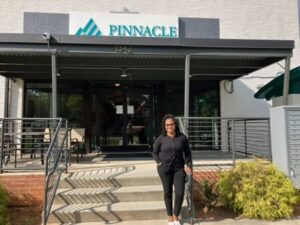By Paul Bolster
The Georgia General Assembly is currently in the first of two sessions that will take place before the next election in 2022. The Porch Press spoke with some local elected officials to discuss their hopes and concerns.
The 2020 election did not significantly change the Republican-dominated party alignment in either the House or the Senate. Democrats did pick up one seat in the Senate. DeKalb Representative Mary Margaret Oliver, who was appointed as chair of the MARTA oversight committee by Republican Speaker of the House David Ralston, is the only Democrat among 41 committee chairs. Senator Nan Orrock was also appointed to the oversight committee. Additionally, Senator Elena Parent, who represents most of East Atlanta, was elected chair of the Democratic Caucus in the Senate.
Members of the minority party have few opportunities to pass legislation. Their votes and leadership are important when Republican leaders want or need bipartisan support for measures. Minority members often develop legislation credited to members from the other side of the aisle. Democrats do control local legislation in both Fulton and DeKalb counties, but the scope of this legislation is limited. Control over homestead exemptions gives significant power to affect the distribution of the property tax burden; however, reforming the assessment standards and process requires state legislation.
So what are their common concerns and individual efforts? Democratic legislators are wary of the impact of redistricting. Redrawing the lines for legislative districts, which occurs every ten years based on the U.S. Census, will take place in a special session at the end of the year. It will be late because the 2020 Census numbers are delayed. Parent warned that Republicans will try to “grant themselves disproportionate power” through redistricting. She believes Republicans will seek to maintain their legislative power through district lines that diminish the influence of many Georgia voters. Orrock agrees. “There will be big fights over the ‘stacking and packing’ as members try hard to pick their voters. The public needs access to the redistricting process at all stages,” she said.
In her newsletter, Senator Elena Parent warned that Republicans are seeking to increase voter suppression and pledged to fight any effort to “restrict access to the ballot.” On the election front, she plans to introduce legislation to allow the cities of Brookhaven, Doraville, and Johns Creek to use “ranked choice voting” to select their officials. To reduce the cost of runoff elections, she will also propose a bill to create ranked-choice voting in federal elections for military and overseas voters. She will oppose Republican efforts to change access to “no excuse” mail-in ballots. Parent believes that ID requirements for mail-in ballots discriminate against people who do not have access to technology.
She is also concerned that the new budget from Governor Kemp restores only half of the funds cut from education and thinks they should be fully restored. The governor could do this by accessing the funds in the state “rainy day fund” which holds $2.7 billion. Instead, he has added $250 million to the Revenue Shortfall Reserve.
Senator Nan Orrock, a longtime member of the Appropriations Committee, says the pandemic has made it hard to predict revenues and budget for expenditures. The federal Coronavirus Aid, Relief, and Economic Security (CARES) Act has eased some of the impact of the cuts made in the last session, and the Biden rescue bill could bring further relief to this year’s budget. Governor Kemp has restored $647 million of the $1 billion cut from education in the last session and found $20 million to expand broadband in rural parts of the state. There will be no pay raises for teachers, but guards at correctional facilities will get a 10% raise. Teachers will instead receive a $1,000 bonus.
Orrock is also concerned that there are only minor improvements in the mental health budget at a time when mental health concerns are increasing. She is highly critical of the governor’s plan to end access to the healthcare.gov marketplace that offers insurance plans under the Affordable Care Act. There is money in the budget for newly-granted Medicaid waivers, but Orrock points out they do not help those most in need as full Medicaid expansion would do. “The state Medicaid money could be spent more effectively. The state ought to wait and explore what kind of a deal we might get from the new Biden administration,” she said. The Georgia Budget and Policy Institute shows that the governor’s partial expansion covering approximately 31,000 people will cost $2,054 per person, while a full Medicaid expansion covering 482,000 individuals would cost $298 per person.
Like most Democrats, Orrock believes Governor Kemp should access the “rainy day fund” to restore some cuts. She is particularly concerned about the backlog of unemployment claims at the Labor Department. “I get lots of calls from people who can’t get their claims processed. Nobody answers the phone.” She recently suggested to the Appropriations Chair that the Labor Department could use National Guard troops to set up call centers and cut into the backlog.
Orrock will be part of a bipartisan working group that will seek to increase need-based scholarship money. “There are students who are not B-average kids who need an opportunity for higher education and during a recession they are going to need financial help,” she said, and adds that a recession is a good time to expand educational opportunities.
Representative David Dreyer is also concerned that the Republican majority in the Georgia legislature will limit the use of voting by mail. He says the testimony from multiple levels of government shows there was no evidence of voter fraud. Although House Speaker Ralston has said he does not favor restricting the no-excuse mail-in ballots, he has appointed a special committee that is headed by a proponent of further voting restrictions. Dreyer will also work on legislation related to the homestead exemption which he expects to be included on the city election ballot in November.
In her newsletter, Representative Bee Nguyen highlighted appropriation issues regarding education, unemployment claims, and Medicaid. Like other Democrats, she does not support Governor Kemp’s expenditures that provide only a small increase in access to insurance by poor people in the state. His Medicaid waivers, approved by the Trump administration just before the election, will only expand access to insurance under the Affordable Care Act to an additional 31,000 Georgians. The CARES Act has provided significant help to the state by reducing the state’s required match by 6%. This relief is found in many corners of the state’s healthcare budget.
Some CARES Act funds are provided to local school systems. The budget impact of these federal dollars makes it difficult to see if public education is being properly funded. At best, when combined with the governor’s new commitment, the funds will keep local public education funding at levels approved prior to the pandemic and provide for increased enrollment. However, this funding probably will not be enough to cover additional pandemic-related expenditures.
Nguyen also is critical of the governor’s budget proposals for the Department of Labor which restores none of the money that was cut last year. Processing unemployment claims is a big problem. However, CARES Act dollars were recently given to the Unemployment Trust Fund to prevent an increase in the unemployment tax on employers.
Nguyen will author legislation to require the storage of breast milk for nursing mothers in the correctional system. She will also sign on to the bipartisan ranked choice voting bill proposed by Senator Parent as well as a bill to remove the statue of Alexander Stephens, Vice President of the Confederacy, from the Capitol. In addition, Nguyen has joined other Democrats as an author of a bill to restore voting rights to Georgians who have committed felony offenses. Georgia has some of the most restrictive state laws on this issue.
Many of the important meetings of the state legislature are available on video at www.legis.ga.gov. They are streamed live and recorded for future viewing. Senator Orrock, who will chair meetings of the City of Atlanta delegation this year, said that those meetings will also be made available on video. The delegation will meet every Friday after 12:00pm.
For more information on the budget, go to the Georgia Budget and Policy Institute’s website at www.gbpi.org.









Comments are closed.